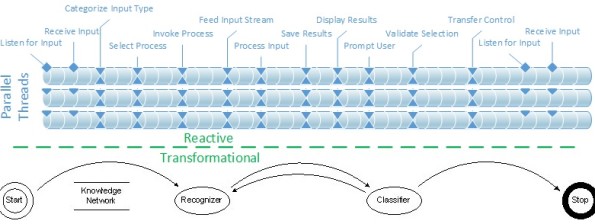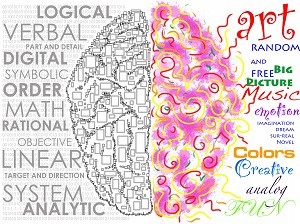Category Archives: Cognitive Science
03 Jul Do Yawl do Petri Nets

Where do you draw a line? In geometry, digital theory, language and time, patterns tend to be linear: they bear distinct sequences. The sequences in these domains either contribute to the meaningfulness of the patterns, or, in the case of time, are the foundation of the patterns. Any logic that focuses on these sequential patterns is linear logic. Temporal Logic […]
01 Jul Chaos About Us

Chaos About Us Chaos is all about us. I know that for certain each time I look into my kids’ rooms. When I recall my own youth, however, it occurs to me that I had a reason for the way I organized my life. It seemed meaningful to me, and although I recall how difficult it was […]
23 Jun Information Transformation

Information Exchange and Transformation Knowledge does the most good when shared. Knowledge that gets lodged in one place may not be particularly useful to many people. But moving digital information from place to place has its dangers. Automating data movement can introduce security or confidentiality issues, data duplication challenges, as well as raising the specter of […]
16 Jun Genetic Cross-Pollination

Cross Pollination Many approaches exist for simulating intelligent behavior on computers. In the past, the most popular approach was to focus on developing a technique and applying it to a problem. Most basic research has focused on single paradigms and their properties. Sometimes, however, in domains where multiple approaches to problem solving are possible, some […]
05 Jun Intelligent Traveling Salesmen

Another Sample Problem Several specific reasoning or inference problems have provided fodder for AI textbooks and experiments. One of these is the traveling salesman problem (Get an explanation and an example applet here): Given a traveling salesman who must get to x number of cities, find the shortest route the salesman can travel to reach […]
03 Jun Distributed Knowledge Representation

Distributed KR Knowledge representation schemata may be top-down, or bottom-up. In a top-down approach, one would define an area or domain of knowledge, then list the concepts within the domain and their attributes. Behaviors within the domain are often defined by that domain, and the concepts may not be able to exist independently. This approach helps enforce a […]
02 Jun Framing Formal Logic

Formal Logic Formal logic often uses set theory. Set theory uses existential (an assertion that something applies to some members of a set) and universal (a statement that applies to all members in a set) quantifiers. Despite the utility and noncommittal correctness of existential quantifiers, set operations using existential quantifiers are weaker then those using universal quantifiers. The […]
28 May Data and Modeling

Data modeling is essential in the early stages of any information system design. By moving toward a data-centered model, we can make our data, and our system, smarter. There are many data-modeling techniques, but we will focus on two for now: Entity Relationship Diagramming (ERD), and Object Role Modeling or object relational modeling (ORM). Entity […]






